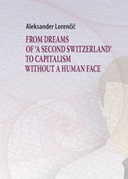Explore

From Dreams Of 'A Second Switzerland' To Capitalism Without A Human Face
0 Ungluers have
Faved this Work
Login to Fave
Tri desetletja samostojne države so vsekakor doba, ko lahko podamo mnenje o tranzicijskem procesu, ki se je na formalni ravni končal z vstopom v EU, tudi z zgodovinskega gledišča. Če se je vse do formalnega zaključka slovensko gospodarsko tranzicijo označevalo zlasti kot zgodbo o uspehu, so po letu 2004 v ospredje vse bolj stopala vse prej kot pozitivna mnenja in ocene. Knjiga obravnava osrednje procese gospodarske tranzicije, ki so spremenili gospodarsko sestavo, jo učvrstili in posodobili do te mere, da je slovensko gospodarstvo lahko hitreje dohitevalo razviti svet. Cilji avtorjevega zgodovinskega iskanja in spraševanja so pot v tranzicijo, vstopanje Slovenije v različne mednarodne integracije, makroekonomska stabilizacija, privatizacija in prestrukturiranje gospodarstva. Osvetli tudi problematiko regionalnega razvoja in razloge, zaradi katerih v obravnavanem obdobju ni prišlo do zmanjševanja medregionalnih razlik. Posebno pozornost namenja tudi gospodarski kriminaliteti, ki je tako posameznikom, kot podjetjem in državi povzročala veliko škode. Avtor v argumentirani pripovedi predstavi tudi značilnosti in dosežke procesa gospodarske preobrazbe v Srbiji ter na Hrvaškem, Češkem, Madžarskem in Poljskem.;Three decades of an independent state are certainly a long enough period to give an opinion on the transition process, which formally ended with the country’s accession to the EU, even from a historical point of view. Until its formal conclusion, the Slovenian economic transition was described primarily as a story of success, but the period after 2004 was marked by everything but positive opinions and assessments. The book discusses the central processes of economic transition, which changed Slovenia’s economic structure, strengthening and modernizing it to such an extent that the country was able to catch up with the developed world much more quickly. The aims of the author’s historical search and inquiry are the path to transition, Slovenia’s entry into various international integrations, macroeconomic stabilization, privatization, and economic restructuring. He also sheds light on the issue of regional development and identifies the reasons why the intended reduction of interregional disparities did not take place in the period under examination. Special attention is paid to economic crime, which caused enormous financial damage to citizens, companies, and the state as a whole. In a substantiated narrative, the author also presents the characteristics and achievements of the process of economic transformation in Croatia, Serbia, the Czech Republic, Hungary, and Poland.
This book is included in DOAB.
Why read this book? Have your say.
You must be logged in to comment.
Rights Information
Are you the author or publisher of this work? If so, you can claim it as yours by registering as an Unglue.it rights holder.Downloads
This work has been downloaded 65 times via unglue.it ebook links.
- 65 - pdf (CC BY-NC-ND) at Unglue.it.
Keywords
- 1990
- collective volume
- Eastern Europe
- Economic history
- Economic Systems
- Economics
- Economics, finance, business & management
- economy
- ekonomska zgodovina
- ekonomski sistemi
- Europe
- Geographical Qualifiers
- gospodarstvo
- Slovenia
- Slovenija
- Southeast Europe
- thema EDItEUR::1 Place qualifiers::1D Europe::1DX Southeast Europe::1DXV Slovenia
- thema EDItEUR::K Economics, Finance, Business and Management::KC Economics::KCZ Economic history
- transition
- tranzicija
- Yugoslavia & former Yugoslavia
- zborniki
Links
DOI: 10.3986/9789610505709Editions

